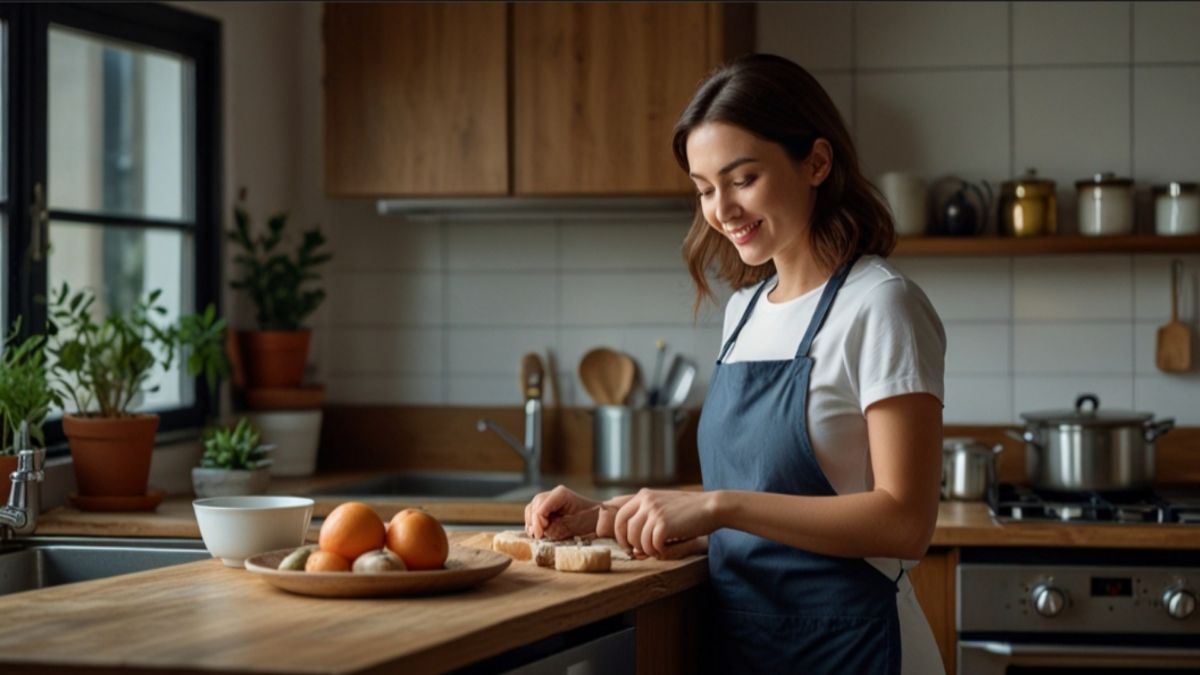
10 Essential Cooking Tips for Women New to the Kitchen
2 Min Read
Cooking is an invaluable life skill, but for women new to the kitchen, it can be intimidating. From mastering basic techniques to knowing what kitchen tools to use, cooking doesn’t have to be a daunting experience. By learning a few essential tips and tricks, you can quickly build confidence and start enjoying your time in the kitchen.
In this guide, we will explore 10 essential cooking tips that will help you get started and make the process more enjoyable.
1. Invest in Essential Kitchen Tools
Before you start cooking, it’s important to have the right tools. A few essential kitchen tools can make a world of difference when it comes to prepping and cooking meals efficiently. For beginners, it’s not necessary to have an overwhelming amount of equipment—focus on the basics.
Here’s a list of must-have kitchen tools for any beginner cook:
- A good chef’s knife
- Cutting board
- Measuring cups and spoons
- Mixing bowls
- Non-stick frying pan
- Baking sheet
- Spatula and tongs
- Colander
These essential tools will allow you to handle most basic recipes and will make your kitchen experience smoother.
2. Learn Basic Knife Skills
One of the most important skills to master in the kitchen is knowing how to handle a knife properly. Knife skills are essential for chopping, slicing, and dicing ingredients efficiently and safely.
Learning how to hold the knife correctly and practicing basic chopping techniques will save you time and reduce the risk of accidents. You can start by mastering simple cuts such as the dice, slice, and julienne. Practice on vegetables like onions, carrots, and bell peppers.
3. Read Recipes Thoroughly Before Starting
Before diving into a recipe, it’s crucial to read through it entirely. This helps you understand the ingredients and the steps involved, allowing you to gather everything you need beforehand. Many beginners make the mistake of starting without reading the recipe thoroughly, leading to last-minute scrambles or missed steps.
By reading the recipe, you’ll know if you need to make substitutions or adjustments and whether you have enough time to complete the dish.
4. Master Basic Cooking Techniques
Instead of trying to learn complex recipes right away, it’s better to start with basic cooking techniques that will be useful in a wide range of dishes. Techniques like sautéing, boiling, roasting, and grilling are essential building blocks for countless recipes. Once you master these, you’ll have the foundation to explore more complex cooking methods.
For instance, sautéing vegetables or grilling chicken breasts are skills you’ll find yourself using frequently. Mastering these basics ensures your meals are cooked properly and taste delicious.
5. Season Your Food Properly
Seasoning your food is key to making it taste flavorful. As a beginner, it’s easy to under-season or over-season dishes, but with practice, you’ll get the hang of it. Salt and pepper are your best friends in the kitchen, but don’t forget to explore other herbs and spices for added flavor.
Start by adding a pinch of salt to taste, then slowly adjust. Always taste your food as you go to ensure the seasoning is balanced. Spices like garlic powder, paprika, and cumin can add complexity to your dishes.
6. Organize Your Cooking Space
A cluttered kitchen can be overwhelming, especially for beginners. To make your cooking process smooth, keep your cooking space organized. Have your tools, ingredients, and spices within easy reach. This will save you time and make the entire experience more enjoyable.
Consider setting up a workstation where everything you need is in one spot. Having a clean, tidy area will help you focus on cooking rather than searching for ingredients or utensils.
7. Start with Simple Recipes
When you’re new to cooking, it’s tempting to dive into complicated recipes with multiple ingredients and steps. However, starting with simple recipes will help you build confidence and avoid frustration.
Look for beginner-friendly recipes with fewer ingredients and easy-to-follow instructions. As you become more comfortable, you can gradually experiment with more complex dishes. Consider starting with classics like pasta, stir-fries, or baked chicken, which are relatively forgiving for beginners.
8. Meal Prep to Save Time
Meal prepping is a great strategy for women who are new to the kitchen and want to save time throughout the week. By preparing meals or key ingredients in advance, you can reduce the stress of daily cooking and avoid last-minute takeout.
You can start by prepping ingredients like vegetables, grains, and proteins that can be used in multiple dishes. For example, chopping vegetables and cooking grains ahead of time will make it easier to assemble meals quickly during the week.
Here’s a simple meal-prep strategy for beginners:
- Choose a few recipes for the week
- Cook proteins like chicken, beef, or tofu in bulk
- Pre-chop vegetables for salads, stir-fries, or snacks
- Cook grains like quinoa or rice in large batches
- Store prepped ingredients in portioned containers
This method will not only save you time but also ensure you have healthy and delicious meals ready to go.
9. Learn to Avoid Common Mistakes
Everyone makes mistakes in the kitchen, especially when they’re just starting out. However, learning to avoid common pitfalls will help you improve your cooking skills faster.
Here are some common mistakes beginners make and how to avoid them:
- Not tasting food as you go: Always taste your dish throughout the cooking process to adjust seasoning and ensure balanced flavors.
- Overcrowding the pan: When sautéing or frying, overcrowding the pan can cause food to steam rather than sear. Cook in batches to avoid this.
- Overcooking or undercooking: Follow recipe instructions closely and use timers to prevent overcooking or undercooking.
- Not allowing meat to rest: After cooking, let meat rest for a few minutes to retain juices, which results in a more flavorful dish.
- Forgetting to preheat the oven: Always preheat the oven before baking or roasting to ensure even cooking.
By recognizing these mistakes and correcting them, you’ll become a more skilled and confident cook.
10. Don’t Be Afraid to Experiment
As you gain confidence in the kitchen, don’t be afraid to experiment with flavors, ingredients, and techniques. Cooking is both a science and an art, and part of the fun is trying new things. You might find that you enjoy certain cooking methods or ingredients that you hadn’t considered before.
Start by making small changes to recipes you’re already familiar with. For instance, swap out vegetables in a stir-fry or add different herbs and spices to a soup. As you experiment more, you’ll develop a personal cooking style and preferences.
Remember that cooking is a learning process, and it’s okay to make mistakes along the way. The key is to enjoy the process and continuously improve your skills.
Bonus Tip: Clean as You Go
One of the most overlooked yet important tips for beginner cooks is to clean as you go. Cooking can create a mess, but cleaning up after yourself as you cook will make the experience more enjoyable and less overwhelming.
Wash dishes, wipe down counters, and put away ingredients as you use them. This habit will save you from a big cleanup at the end and will keep your workspace organized and efficient.
Conclusion
Learning to cook can seem challenging at first, but with the right approach and mindset, anyone can master the basics. By following these 10 essential cooking tips, you’ll not only build confidence in the kitchen but also develop a deeper appreciation for the art of cooking.
From mastering knife skills to experimenting with new flavors, cooking is a journey that takes time and practice. So, whether you’re making simple weeknight meals or venturing into more complex recipes, remember to enjoy the process and celebrate your progress along the way.
With these tips, women new to the kitchen can start their culinary adventure with confidence, creating delicious meals for themselves and their loved ones.


